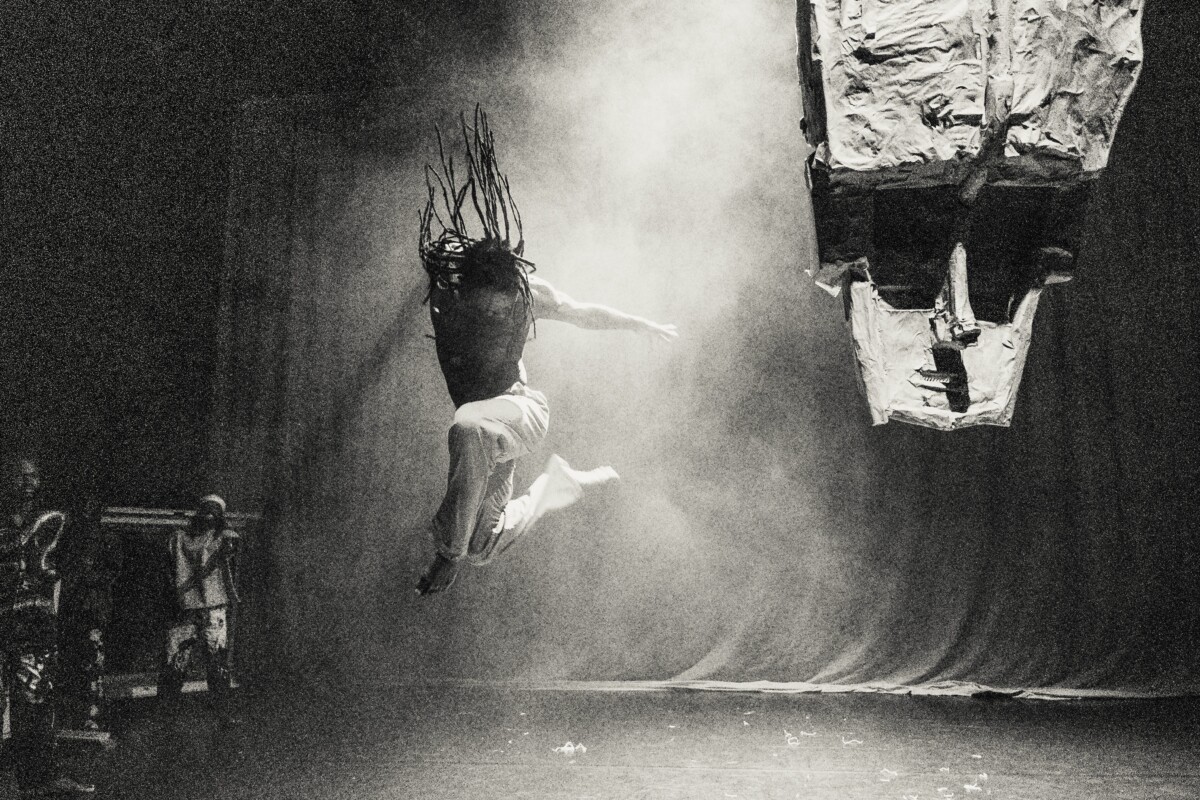Imprisoned Gods
CHOREOGRAPHY & CONCEPT
Lukah Katangila
DANCE
Lukah Katangila, Meshake Lusolo, Bienco Hangi Luanda, Faraja Batumike
DRAMATURGY
Mike van Alfen
MUSIC
Nyati Mayi
Loucka Fiagan
TEXT
Lukah Katangila
VIDEO
Ulysse Navarro
CHOREOGRAPHY SUPERVISION
Moya Michael
MASK
Precy Numbi
COSTUMES
Lukah Katangila
STAGE DESIGN
Pepijn Mesure
LIGHT DESIGN
Benjamin Verbrugge
TECHNIQUE
Pepijn Mesure, Schröder, Benjamin Verbrugge
PRODUCTION
Heleen Schepens, Kenneth Raemaekers
PRODUCTION
Ultima Vez
CO-PRODUCTION
Les Théâtres de la Ville de Luxembourg, De Singel, Workspacebrussels
COLLABORATION
KAAP, STUK, Connexion
WITH THE SUPPORT OF
Tax Shelter measure of the Belgian Federal Government, Ufund.
Ultima Vez is supported by the Flemish Community & the Flemish Community Commission of the Brussels Capital Region

In Imprisoned Gods (MIUNGU GEREZANI), Lukah delves into ancestral African beliefs, focusing on the peoples of Alkebulan, the ancient name for the continent. Communities like the Weusi possessed a rich spiritual culture and a deep understanding of nature. However, the arrival of colonizers and Christianity, with its emphasis on a single god, disrupted these beliefs, creating a dichotomy of good and evil and resulting in the erosion of traditional practices.
The piece is inspired by the song Nakomitunaka by Kiamwangana Verckys, questioning the religious narratives imposed on African populations. African statues and masks, confiscated and displayed in Western museums, are liberated and embodied in this work, while biblical verses and crosses coexist with African traditions. The dancers, hailing from Goma, each bring a distinct style (Rega, Tembo, Shi, Hunde), enriching Lukah’s choreography influenced by these traditional forms. Many statues and cult objects were taken from Congo to Belgium, exhibited as curiosities in museums. As Lukah notes, “The gods have been imprisoned.”
This performance examines the tensions between these two worlds of belief, their meanings, and their contemporary impacts. The statues and masks of the gods, confined in museums, are freed and embodied. The costumes, inspired by the minganji in raffia, symbolize the transmission of power. Masks created by Precy Numbi and visual projections related to Christianity emphasize the tensions between these belief systems. The music, focused on percussion, reinforces this duality and highlights the strength of African traditions in the face of colonial heritage.
“My God, I wonder Where does the black man come from? Jesus, the son of God, is white Adam and Eve are white ... We believe in their white prophets but they refuse to believe in our prophets ...” (translated from Lingala)
Although the dance relies on traditional forms, the goal is not to imitate them but to use them as a frame of reference influencing Lukah’s formal language and choreography. In this context, hip-hop serves as a connection among the dancers. Together, they will explore the essence of their personal history, shape it, and experiment with it, while inviting the audience into a world of movement, where perspectives evolve and dogmas fade.
About Lukah Katangila
Lukah is a dancer, choreographer, and activist from Goma, in the Democratic Republic of Congo.
Introduced to traditional Mboka dances at the age of six, he also developed a passion for hip-hop
and contemporary dance. As a co-founder of the Busara Dance Company, he launched the
Ndoto Goma Kids project after the eruption of Nyiragongo volcano in 2002, aiming to protect
children from recruitment into armed groups. For him, dance is a powerful tool for education and
collective empowerment. He has collaborated with cultural centers for street children and former
child soldiers. His work denounces abuses of power in Congo and conveys strong political messages.
He has collaborated with many artists and performs throughout Africa and Europe. Currently based
in Brussels, he studied choreography at the Royal Academy of Fine Arts (ISAC) and is preparing his
next creation, Imprisoned Gods, with Ultima Vez.
CHOREOGRAPHY & CONCEPT
Lukah Katangila
DANCE
Lukah Katangila, Meshake Lusolo, Bienco Hangi Luanda, Faraja Batumike
DRAMATURGY
Mike van Alfen
MUSIC
Nyati Mayi
Loucka Fiagan
TEXT
Lukah Katangila
VIDEO
Ulysse Navarro
CHOREOGRAPHY SUPERVISION
Moya Michael
MASK
Precy Numbi
COSTUMES
Lukah Katangila
STAGE DESIGN
Pepijn Mesure
LIGHT DESIGN
Benjamin Verbrugge
TECHNIQUE
Pepijn Mesure, Schröder, Benjamin Verbrugge
PRODUCTION
Heleen Schepens, Kenneth Raemaekers
PRODUCTION
Ultima Vez
CO-PRODUCTION
Les Théâtres de la Ville de Luxembourg, De Singel, Workspacebrussels
COLLABORATION
KAAP, STUK, Connexion
WITH THE SUPPORT OF
Tax Shelter measure of the Belgian Federal Government, Ufund.
Ultima Vez is supported by the Flemish Community & the Flemish Community Commission of the Brussels Capital Region











